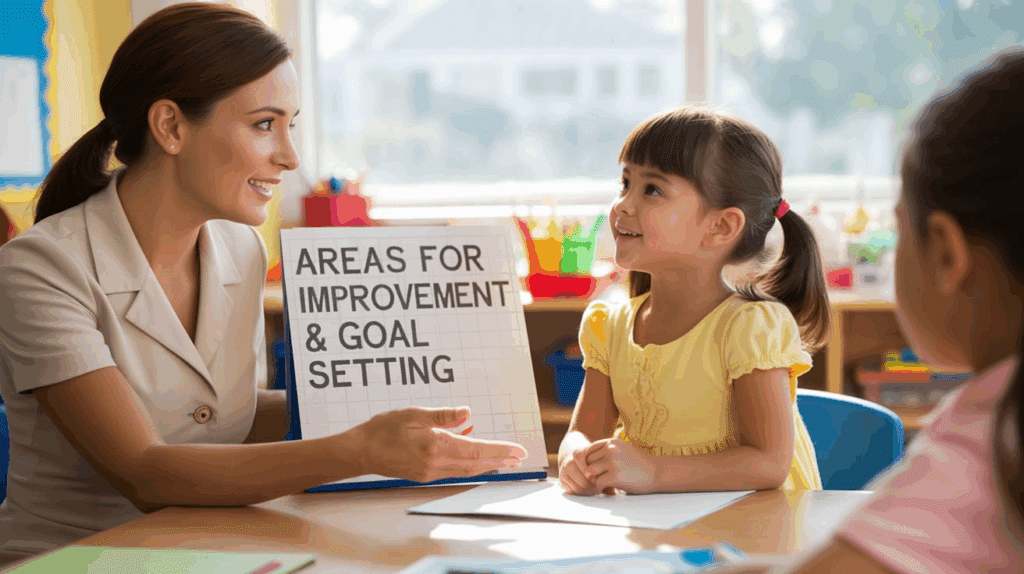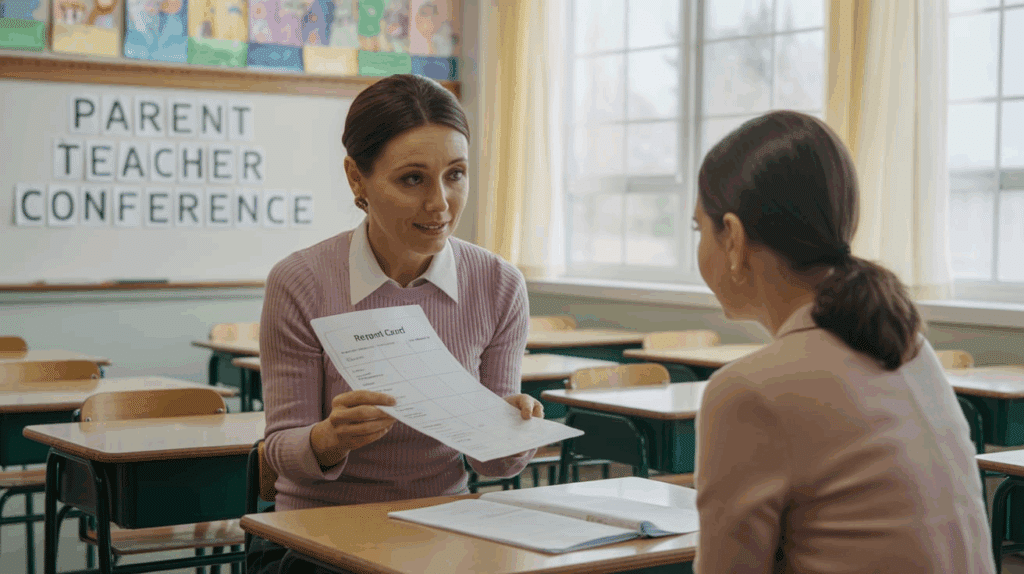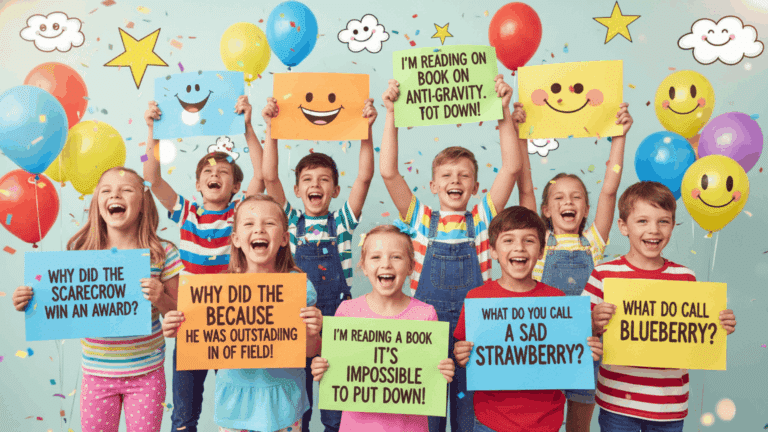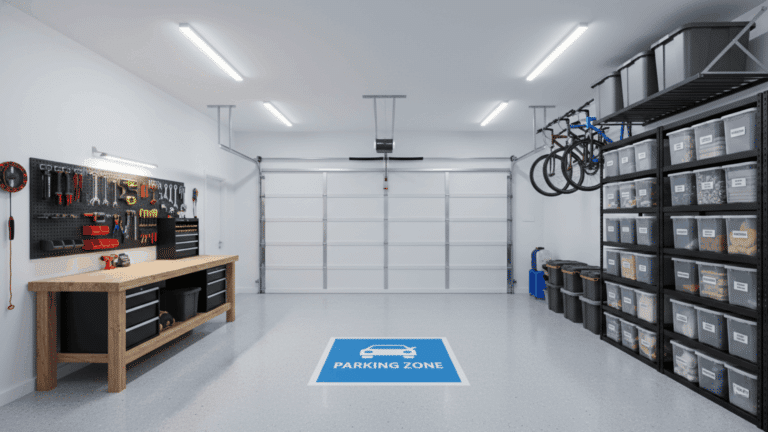Writing meaningful end of the year report card comments for every student feels like an impossible task. Teachers stare at blank screens, struggling to find fresh words for each child.
But what if there was a way to create personalized comments without spending hours on each one? The right approach can help teachers write authentic feedback that parents actually want to read.
When educators use well-crafted end of year comments for report cards, parents feel truly informed about their child’s progress.
Students see genuine recognition of their efforts. And teachers can complete report cards efficiently.
This list provides ready-to-use comments that sound natural and personal.
Why Thoughtful Report Card Comments Matter?
Thoughtful report card comments are far more than just administrative formalities.
They serve as a critical bridge of communication between educators, students, and parents, providing meaningful insights beyond numerical grades.
By crafting personalized, specific feedback, teachers can motivate students, enhance their self-awareness, and offer actionable guidance for improvement.
Moreover, detailed comments for report cards demonstrate genuine care and investment in each student’s learning process, helping to build trust and engagement.
They convert report cards from mere evaluation tools into powerful instruments of encouragement, reflection, and educational support.
How to Structure Effective End of the Year Report Card Comments
Crafting impactful report card comments requires a strategic approach that balances honesty, encouragement, and constructive guidance.
The structure of these comments can significantly influence how students and parents perceive academic progress and potential.
Key elements for structuring effective report card comments include:
- STEP 1: Begin with a positive observation that highlights the student’s strengths and unique contributions to the classroom environment.
- STEP 2: Provide specific, concrete examples that illustrate the student’s current performance, avoiding vague or generic statements.
- STEP 3: Balance constructive criticism with actionable suggestions for improvement, focusing on growth opportunities.
- STEP 4: Use a balanced tone that is professional, empathetic, and supportive, demonstrating genuine investment in the student’s development.
- STEP 5: Personalize comments to reflect the individual student’s learning style, challenges, and potential.
End of Year Report Card Comments for Every Student
Ready-to-use comments for report cards can save educators time while ensuring meaningful, personalized feedback.
Use them as-is or customize them to better reflect your classroom observations.
Academic Achievement & Progress

Recognizing academic achievement and progress is key to highlighting each student’s learning journey.
These end-of-year report comments focus on how students have grown, overcome challenges, or excelled in various subjects.
-
Consistently demonstrates mathematics skills and applies these skills effectively.
-
Has shown great improvement in reading comprehension and continues to improve steadily.
-
Excels in scientific inquiry and enjoys challenging tasks.
-
Needs continued support with historical analysis but would benefit from additional practice.
-
Has developed strong skills in writing structure and consistently meets expectations.
-
Shows enthusiasm for problem-solving and shows growth in this area.
-
Struggles with critical thinking and needs encouragement to stay focused.
-
Demonstrates a solid understanding of oral communication and has become more confident.
-
Is progressing well in research skills and continues to build confidence in this area.
-
Continues to build confidence in literary interpretation and enjoys challenging tasks.
-
Shows enthusiasm for oral communication and shows growth in this area.
-
Consistently demonstrates research skills and applies these skills effectively.
-
Excels in writing structure yet still requires occasional reminders.
-
Consistently demonstrates oral communication and consistently meets expectations.
-
Has developed strong skills in scientific inquiry and applies these skills effectively.
-
Has shown great improvement in historical analysis and continues to improve steadily.
-
Needs continued support with mathematics and needs to work on accuracy.
-
Demonstrates a solid understanding of reading comprehension and enjoys challenging tasks.
-
Struggles with literary interpretation but would benefit from additional practice.
-
Is progressing well in problem-solving and shows growth in this area.
-
Continues to build confidence in research skills and consistently meets expectations.
-
Excels in critical thinking and applies these skills effectively.
-
Has shown great improvement in oral communication and has become more confident.
-
Shows enthusiasm for writing structure yet still requires occasional reminders.
-
Demonstrates a solid understanding of mathematics and needs to work on accuracy.
-
Has developed strong skills in reading comprehension and continues to improve steadily.
-
Is progressing well in scientific inquiry and enjoys challenging tasks.
-
Consistently demonstrates historical analysis and consistently meets expectations.
-
Excels in problem-solving and shows growth in this area.
-
Struggles with critical thinking and needs continued support with this skill.
-
Needs continued support with oral communication and needs encouragement to stay focused.
-
Has developed strong skills in research skills and applies these skills effectively.
-
Has shown great improvement in literary interpretation and continues to improve steadily.
-
Shows enthusiasm for mathematics and has become more confident.
-
Consistently demonstrates reading comprehension and enjoys challenging tasks.
-
Excels in scientific inquiry and consistently meets expectations.
-
Demonstrates a solid understanding of writing structure and needs to work on accuracy.
-
Is progressing well in historical analysis and has become more confident.
-
Needs continued support with problem-solving but shows growth in this area.
-
Shows enthusiasm for critical thinking and enjoys challenging tasks.
-
Struggles with research skills but would benefit from additional practice.
-
Has developed strong skills in oral communication and consistently meets expectations.
-
Has shown great improvement in writing structure and continues to improve steadily.
-
Excels in literary interpretation and shows growth in this area.
-
Continues to build confidence in reading comprehension and applies these skills effectively.
-
Consistently demonstrates scientific inquiry and enjoys challenging tasks.
-
Struggles with historical analysis and needs encouragement to stay focused.
-
Is progressing well in mathematics and continues to improve steadily.
-
Shows enthusiasm for research skills and consistently meets expectations.
-
Demonstrates a solid understanding of problem-solving and applies these skills effectively.
-
Excels in oral communication and has become more confident.
-
Has developed strong skills in critical thinking and continues to improve steadily.
-
Consistently demonstrates writing structure and enjoys challenging tasks.
-
Is progressing well in literary interpretation and shows growth in this area.
-
Struggles with mathematics but has shown great improvement.
-
Continues to build confidence in reading comprehension and consistently meets expectations.
-
Needs continued support with scientific inquiry and needs to work on accuracy.
-
Has developed strong skills in historical analysis and enjoys challenging tasks.
-
Excels in problem-solving and applies these skills effectively.
-
Demonstrates a solid understanding of critical thinking and continues to improve steadily.
-
Has shown great improvement in oral communication and consistently meets expectations.
-
Is progressing well in research skills and enjoys challenging tasks.
-
Struggles with writing structure but would benefit from additional practice.
-
Shows enthusiasm for literary interpretation and has become more confident.
-
Consistently demonstrates mathematics and applies these skills effectively.
-
Needs continued support with reading comprehension and needs encouragement to stay focused.
-
Has developed strong skills in scientific inquiry and consistently meets expectations.
-
Demonstrates a solid understanding of historical analysis and applies these skills effectively.
-
Excels in problem-solving and continues to improve steadily.
-
Is progressing well in critical thinking and enjoys challenging tasks.
-
Struggles with oral communication but has shown improvement.
-
Continues to build confidence in research skills and applies these skills effectively.
-
Has shown great improvement in writing structure and consistently meets expectations.
-
Shows enthusiasm for literary interpretation and continues to improve steadily.
-
Consistently demonstrates reading comprehension and has become more confident.
-
Has developed strong skills in scientific inquiry and enjoys challenging tasks.
-
Excels in historical analysis and applies these skills effectively.
-
Is progressing well in problem-solving and consistently meets expectations.
-
Needs continued support with critical thinking but shows growth in this area.
-
Demonstrates a solid understanding of oral communication and enjoys challenging tasks.
-
Has shown great improvement in research skills and continues to build confidence.
-
Struggles with writing structure but would benefit from additional practice.
-
Continues to build confidence in literary interpretation and has become more confident.
-
Excels in mathematics and consistently meets expectations.
-
Is progressing well in reading comprehension and enjoys challenging tasks.
-
Demonstrates a solid understanding of scientific inquiry and applies these skills effectively.
-
Has developed strong skills in historical analysis and continues to improve steadily.
-
Shows enthusiasm for problem-solving and consistently meets expectations.
-
Consistently demonstrates critical thinking and applies these skills effectively.
-
Struggles with oral communication and needs encouragement to stay focused.
-
Excels in research skills and continues to improve steadily.
-
Has shown great improvement in writing structure and enjoys challenging tasks.
-
Demonstrates a solid understanding of literary interpretation and consistently meets expectations.
-
Needs continued support with mathematics and needs to work on accuracy.
-
Is progressing well in reading comprehension and has become more confident.
-
Shows enthusiasm for scientific inquiry and applies these skills effectively.
-
Struggles with historical analysis but shows growth in this area.
-
Continues to build confidence in problem-solving and consistently meets expectations.
-
Excels in critical thinking and enjoys challenging tasks.
-
Has developed strong skills in oral communication and continues to improve steadily.
Work Habits & Effort

The comments below aim to reflect a wide spectrum of classroom behaviors and engagement levels. They can be used directly or adapted to fit individual student performance.
-
Consistently puts forth maximum effort in all class activities.
-
Demonstrates a strong work ethic and takes pride in quality work.
-
Often completes assignments ahead of time and with attention to detail.
-
Needs occasional reminders to stay focused and complete tasks.
-
Shows initiative by seeking help and asking relevant questions.
-
Frequently shows self-motivation and independence in learning.
-
Requires support with staying organized and meeting deadlines.
-
Maintains a positive attitude toward class responsibilities.
-
Shows improvement in managing time and classroom tasks.
-
Needs encouragement to take more academic risks and try new strategies.
-
Demonstrates responsibility by completing tasks with minimal supervision.
-
Is beginning to develop more consistent work habits.
-
Often needs redirection to stay on task during work periods.
-
Consistently completes homework and classroom assignments on time.
-
Occasionally requires support to finish work independently.
-
Has shown noticeable improvement in task completion this year.
-
Uses class time efficiently and stays engaged during lessons.
-
Benefits from using checklists or reminders to stay organized.
-
Puts forth consistent effort and strives for personal best.
-
Demonstrates perseverance when faced with challenges.
-
Takes responsibility for learning and shows growing independence.
-
Regularly follows through with responsibilities and class expectations.
-
Often needs prompting to begin assignments or stay on track.
-
Responds well to feedback and works to improve performance.
-
Demonstrates care and attention in completing classwork.
-
Sometimes rushes through assignments and overlooks details.
-
Shows a willingness to improve and grow academically.
-
Uses feedback constructively to improve future efforts.
-
Frequently monitors own progress and self-corrects when needed.
-
Needs to work on maintaining focus throughout independent tasks.
-
Participates actively and contributes meaningfully to class work.
-
Sometimes struggles with time management and task prioritization.
-
Maintains consistent effort across all subjects.
-
Completes tasks with accuracy and thoughtfulness.
-
Needs encouragement to follow through on multi-step tasks.
-
Often works diligently but may benefit from checking work more carefully.
-
Demonstrates increasing independence and confidence in learning tasks.
-
Frequently sets personal goals and works hard to achieve them.
-
Can be relied on to complete work responsibly and on time.
-
Occasionally struggles with staying focused during quiet work time.
-
Demonstrates strong organizational skills and uses time well.
-
Needs to improve in balancing speed and accuracy in work.
-
Is developing a more focused and consistent approach to assignments.
-
Takes care to present work neatly and clearly.
-
Sometimes becomes distracted, affecting the quality of work.
-
Is learning to take more academic initiative and self-direction.
-
Follows routines well and responds positively to structure.
-
Often takes pride in completing assignments to the best of ability.
-
Needs reminders to complete work during designated times.
-
Completes most tasks independently with minimal support.
-
Frequently seeks clarification to ensure task accuracy.
-
Uses classroom tools and resources to support work habits.
-
Demonstrates a growing ability to manage workload effectively.
-
Maintains focus for extended periods during independent work.
-
Benefits from setting goals and tracking progress over time.
-
Requires consistent support to meet academic responsibilities.
-
Often revises and improves work without being prompted.
-
Demonstrates care in following directions and task requirements.
-
Sometimes needs extra time to complete tasks thoroughly.
-
Displays excellent attention to detail and task accuracy.
-
Enjoys taking on new challenges and perseveres through difficulties.
-
Responds well to structure and consistent expectations.
-
May benefit from improved study and organizational skills.
-
Frequently completes high-quality work with minimal guidance.
-
Needs to develop greater consistency in work habits.
-
Often double-checks work to avoid careless errors.
-
Demonstrates enthusiasm for learning tasks and classroom routines.
-
Sometimes needs reminders to bring required materials.
-
Takes initiative to help others stay on task.
-
Is becoming more responsible and dependable in class.
-
Regularly completes work beyond basic expectations.
-
Occasionally delays task completion without clear reason.
-
Demonstrates a determined approach to difficult assignments.
-
Needs reminders to pace work and avoid rushing.
-
Makes steady progress in taking ownership of learning.
-
Engages with tasks thoughtfully and purposefully.
-
Benefits from frequent check-ins to remain on task.
-
Frequently shows commitment to academic goals.
-
Occasionally forgets or misplaces materials for assignments.
-
Demonstrates resilience when facing academic challenges.
-
Often follows through with corrections and improvements.
-
Sometimes needs support to stay organized and focused.
-
Actively works to improve and achieve personal targets.
-
Makes good use of class resources and instructional time.
-
May need guidance in setting realistic academic goals.
-
Puts in sustained effort even when tasks are challenging.
-
Occasionally needs redirection to remain focused.
-
Enjoys working independently and seeks feedback.
-
Requires reminders to complete long-term assignments.
-
Approaches classroom responsibilities with maturity.
-
Often leads by example through strong work ethic.
-
Needs to prioritize accuracy over speed in assignments.
-
Takes great pride in completed assignments.
-
Can be trusted to work diligently without supervision.
-
Works steadily to improve the quality of all work.
-
May benefit from setting small, achievable daily goals.
-
Actively participates and shows responsibility in group tasks.
-
Frequently takes initiative to support classroom routines.
-
Is developing greater awareness of personal work habits.
-
Consistently demonstrates determination and a positive attitude toward learning.
Behavior & Social Development

They reflect how students interact with peers, follow rules, and contribute to a positive learning environment.
Whether a student is a leader, team player, or still learning self-regulation, these end of the year report card comments provide meaningful insight.
-
Consistently demonstrates respect toward peers and adults.
-
Is a positive role model for classmates.
-
Follows school and classroom rules without reminders.
-
Responds well to authority and classroom expectations.
-
Is considerate and kind to others.
-
Participates in class discussions respectfully and thoughtfully.
-
Displays leadership qualities and encourages peers.
-
Resolves conflicts peacefully and maturely.
-
Works cooperatively in group settings.
-
Frequently offers help to peers in need.
-
Demonstrates empathy and compassion toward others.
-
Often volunteers for classroom responsibilities.
-
Is learning to accept consequences for inappropriate behavior.
-
Demonstrates self-control in a variety of situations.
-
Accepts feedback with a positive attitude.
-
Frequently puts the needs of the group ahead of personal preferences.
-
Is learning to manage frustration in socially appropriate ways.
-
Shows improvement in managing emotional responses.
-
Demonstrates patience and tolerance when working with others.
-
Needs occasional reminders to follow classroom expectations.
-
Demonstrates integrity and honesty in behavior.
-
Communicates effectively with both peers and adults.
-
Is learning to take responsibility for personal actions.
-
Frequently contributes to a supportive classroom culture.
-
Needs support developing consistent social boundaries.
-
Follows directions and routines with minimal prompting.
-
Is developing confidence when interacting with others.
-
Sometimes struggles to wait their turn or share.
-
Demonstrates respect for personal and school property.
-
Can be trusted to behave appropriately in different settings.
-
Is learning to resolve conflicts with minimal adult assistance.
-
Responds appropriately to redirection.
-
Frequently models positive behavior for classmates.
-
Is becoming more consistent in following class rules.
-
Shows enthusiasm for team-based activities.
-
Takes pride in treating others fairly and kindly.
-
Is learning to listen actively and attentively to others.
-
Sometimes needs reminders to respect others’ personal space.
-
Is respectful of diverse perspectives and backgrounds.
-
Demonstrates cooperation and a willingness to compromise.
-
Is developing more mature social interactions.
-
Frequently takes initiative in group activities.
-
Needs encouragement to include others in group settings.
-
Shows responsibility in maintaining classroom expectations.
-
Can be relied on to help create a positive classroom climate.
-
Sometimes needs support with conflict resolution.
-
Displays appropriate behavior across various school settings.
-
Demonstrates a high level of emotional maturity for their age.
-
Frequently reflects on behavior and makes thoughtful choices.
-
Is a valued member of the classroom community.
-
Needs reminders to remain respectful during discussions.
-
Often supports others in making good behavior choices.
-
Models respectful listening during class activities.
-
Is growing in ability to express emotions appropriately.
-
Interacts positively with both peers and teachers.
-
Is learning to advocate for personal needs in respectful ways.
-
Demonstrates fair play and sportsmanship.
-
Needs support to respond calmly in frustrating situations.
-
Shows initiative in creating inclusive environments.
-
Is learning to respect differing opinions.
-
Approaches group activities with a cooperative attitude.
-
Uses appropriate language in a variety of settings.
-
Responds positively to structure and clear expectations.
-
Is developing consistent self-regulation skills.
-
Sometimes needs redirection to stay focused during group work.
-
Contributes to class discussions respectfully and meaningfully.
-
Respects the rights and feelings of others.
-
Engages respectfully in partner and small-group activities.
-
Understands the importance of honesty and fairness.
-
Needs reminders to take turns during shared activities.
-
Frequently encourages peers to stay on task.
-
Can be counted on to help maintain a respectful classroom.
-
Shows growing confidence in social interactions.
-
Demonstrates a willingness to collaborate with diverse peers.
-
Is learning to manage disagreements with maturity.
-
Has made notable progress in responsible behavior.
-
Is courteous and respectful in daily interactions.
-
May benefit from additional guidance in peer relationships.
-
Demonstrates thoughtfulness when responding to others.
-
Makes positive contributions to class morale.
-
Shows consistency in following classroom norms.
-
Is becoming more independent in managing social choices.
-
Responds calmly to peer interactions.
-
Occasionally needs reminders about appropriate behavior.
-
Often helps resolve peer disagreements peacefully.
-
Demonstrates trustworthiness and dependability.
-
Listens respectfully and considers others’ viewpoints.
-
Sometimes needs encouragement to participate in group discussions.
-
Respects classroom routines and procedures.
-
Responds appropriately to challenging social situations.
-
Interacts respectfully with teachers and classmates.
-
Demonstrates maturity in resolving misunderstandings.
-
Helps foster a welcoming and inclusive classroom environment.
-
Expresses emotions in constructive and respectful ways.
-
Takes initiative to de-escalate conflicts.
-
Shows consistent improvement in managing behavior.
-
Demonstrates a positive attitude toward school expectations.
-
Is mindful of others’ feelings and well-being.
-
Consistently upholds classroom values and behavior standards.
-
Has grown significantly in social awareness and behavior choices.
Areas for Improvement & Goal Setting

Focusing on areas for improvement helps guide students toward future success. These end of the year report card comments highlight specific skills or behaviors that need development, along with constructive suggestions.
They are designed to motivate students and encourage reflection. Use them to promote goal setting and continued personal growth.
-
Would benefit from improving time management and task prioritization.
-
Should focus on completing assignments with greater attention to detail.
-
Needs to participate more actively in class discussions.
-
Is encouraged to ask for help when concepts are unclear.
-
Should work on developing stronger organizational habits.
-
Would benefit from setting and tracking short-term academic goals.
-
Is encouraged to take more academic risks and step outside their comfort zone.
-
Should strive for more consistent focus during independent work.
-
Needs to work on following multi-step directions accurately.
-
Is learning to accept constructive feedback with a growth mindset.
-
Should continue building confidence in presenting ideas to peers.
-
Needs to complete homework more consistently.
-
Would benefit from increased participation in collaborative work.
-
Should focus on editing and revising written work more thoroughly.
-
Is encouraged to develop stronger reading comprehension strategies.
-
Should strive for greater consistency in effort across all subjects.
-
Needs to work on applying math concepts more accurately.
-
Is encouraged to take more initiative in daily tasks.
-
Would benefit from reflecting more deeply on academic performance.
-
Should aim to stay on task for longer periods during class.
-
Is learning to manage frustration in academic settings.
-
Should work on reducing distractions during independent study time.
-
Would benefit from more active engagement in group discussions.
-
Needs to improve the quality and completeness of classwork.
-
Should continue developing note-taking and study skills.
-
Is encouraged to ask clarifying questions during lessons.
-
Needs support in staying organized with materials and assignments.
-
Should work on balancing speed and accuracy in assignments.
-
Is working to improve transitions between activities.
-
Needs to remain focused during instructions and group activities.
-
Would benefit from setting specific academic and behavioral goals.
-
Should continue developing perseverance when faced with challenges.
-
Needs to follow through with long-term assignments more independently.
-
Is encouraged to revise goals based on self-assessment and feedback.
-
Should work on contributing more frequently during class.
-
Would benefit from practicing active listening strategies.
-
Needs to maintain consistent effort, even in less preferred subjects.
-
Is learning to be more accountable for personal learning goals.
-
Should continue working on respectful communication in group settings.
-
Is encouraged to approach challenges with a more positive attitude.
-
Should work on better managing test anxiety and preparation.
-
Would benefit from engaging more deeply with academic content.
-
Needs to use class time more efficiently to complete tasks.
-
Should focus on increasing independence in learning tasks.
-
Is working on improving peer collaboration and cooperation.
-
Needs to take greater responsibility for missed assignments.
-
Is encouraged to develop consistent study routines at home.
-
Should work on initiating tasks without frequent prompting.
-
Needs to be more thorough when checking work for errors.
-
Is developing a more proactive approach to learning.
-
Would benefit from reviewing foundational skills for mastery.
-
Should aim to stay more organized with classroom supplies.
-
Needs to limit social distractions to stay academically focused.
-
Should set personal learning goals and reflect on progress.
-
Is encouraged to strengthen problem-solving strategies.
-
Needs to engage more consistently in reading activities.
-
Should improve handwriting clarity and written communication.
-
Needs to continue developing focus during group instruction.
-
Is encouraged to follow classroom expectations consistently.
-
Should build confidence in speaking up during class.
-
Is learning to evaluate personal work for strengths and areas to improve.
-
Should increase participation in class and group activities.
-
Would benefit from more practice with self-regulation strategies.
-
Needs to take more ownership of learning and academic responsibilities.
-
Should work on developing stronger math fluency.
-
Is encouraged to revisit challenging tasks rather than avoid them.
-
Needs to show more persistence when tasks become difficult.
-
Should improve consistency in submitting assignments on time.
-
Would benefit from strengthening vocabulary and language usage.
-
Needs to be more mindful of neatness and organization in written work.
-
Should work toward greater independence in completing assignments.
-
Is learning to stay focused during extended tasks.
-
Should continue improving communication skills with peers and teachers.
-
Is encouraged to use feedback to revise and enhance work.
-
Needs reminders to remain on task during quiet work times.
-
Would benefit from additional review of key content areas.
-
Should apply learned strategies more consistently during assessments.
-
Needs to show more consistent preparation for daily lessons.
-
Is encouraged to embrace academic challenges as growth opportunities.
-
Should increase awareness of classroom routines and procedures.
-
Needs to continue building self-discipline in academic tasks.
-
Would benefit from increased focus during direct instruction.
-
Should actively seek out learning resources and support when needed.
-
Is working to improve accountability for class responsibilities.
-
Should prioritize academic responsibilities over social interactions during class.
-
Needs to develop stronger focus on accuracy over speed.
-
Should continue developing patience and persistence in learning tasks.
-
Would benefit from improved study and review habits.
-
Needs to stay more consistent with independent reading goals.
-
Should practice careful attention to grammar and punctuation.
-
Is encouraged to be more reflective about personal behavior choices.
-
Should focus on completing multi-step tasks without losing focus.
-
Needs reminders to consistently follow directions.
-
Would benefit from goal-setting conferences with teacher guidance.
-
Should work toward greater responsibility in group projects.
-
Needs to apply more effort toward completing challenging assignments.
-
Should strive for improvement in overall work quality.
-
Is learning to accept academic feedback with a growth-oriented mindset.
-
Needs to continue building focus, responsibility, and academic confidence.
Tips for Saving Time When End of the Year Comments for Report Cards
Writing meaningful report card comments can be time-consuming, especially when managing a full classroom. With the right strategies and tools, you can streamline the process without compromising the quality of your feedback.
Below are practical, time-saving tips to help make report writing more efficient and less stressful.
Use a comment bank: Create or use pre-written comments categorized by subject, behavior, and performance level for quick selection.
Track student progress year-round: Keep digital notes or anecdotal records to reference during reporting time.
Start with templates: Use structured comment templates that allow easy customization for each student.
Batch your work: Write comments in focused sessions by group, skill, or subject to stay efficient.
Personalize efficiently: Use placeholders or merge fields (e.g., names, pronouns) to quickly tailor comments.
Collaborate with colleagues: Share comment samples or reuse phrasing that aligns with your grade or subject.
Avoid over-editing: Write clear, professional comments and resist the urge to perfect every sentence.
By planning ahead and using these strategies, you can reduce stress and spend less time on report cards while still providing thoughtful, effective feedback that supports student growth.
Wrapping It Up
Ultimately, end-of-year report card comments represent far more than a simple assessment of academic performance.
They are a testament to the art of educational communication—a delicate balance of honesty, encouragement, and vision.
By thoughtfully articulating a student’s strengths, challenges, and potential, educators can inspire continued learning, build confidence, and foster a growth mindset.
These comments are not just a record of the past year, but a hopeful blueprint for future academic and personal success, reflecting the profound impact of personalized, compassionate educational guidance.
















